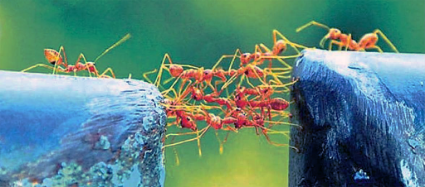If Traffic is an Iterated Prisoner's Dilemma Game Can Smart Cars Evolve Co-operative Behavior?

Can small tribes of cooperating smart cars improve overall traffic even if they are not in the majority? Sure, if every car was a self-driving car maybe traffic jams could dissolve like blood clots on anticoagulants, but what about that messy in-between period? It will be some time before smart cars rule the road. Until then can smart cars make traffic better?
Adoption is hard. This is a general problem in tech. You want people to join your social network yet people won't join until enough people have already joined. What you really want is that virtuous circle to develop, where as more people adopt a technology it causes even more people to adopt it. So startups spend their VC money fast and furiously in hopes of acquiring new customers betting the lifetime value of a customer will be worth the investment. VC money is the dead corpse that feeds the rest of the ecosystem.
Traffic is already an example of a vicious cycle. Horrendous traffic jams are now the norm and "good" traffic windows are just tall tales texted to children. And it keeps on getting worse and not in a worse is better sort of way. Yet the incentives are still not enough for people to self-organize and batch themselves into cars. Cars are more of a synchronous streaming model. Traffic problems will need to be solved at a different level of abstraction. Human drivers are just so hopelessly human.
In some ways traffic is like an iterated game of Prisoner's Dilemma. So in an Evolution of Cooperation sense can overall flows improve if groups of self-driving cars cooperate together within a stream of muggle cars? If smart cars on the road choose to gang up together will that improve commute times in such a way that it will encourage more and more cars to join the gang, becoming part of the solution instead of the problem?
But we have the social network problem. Cars currently are individual, kept in silos organized by manufacturer. Tesla, Uber, Google, etc. don't cooperate at a global traffic planning level. Even cars within a manufacturer don't yet have the ability to slave themselves together in a self-driving conga line of traffic goodness.
Historically we know after individual point solutions are created the next step is to add a scheduling layer. After running a program on an entire CPU we create an OS (Linux, Windows, etc) to run multiple programs on the same CPU. After the container we create an OS (Swarm, Kubernetes, Mesos, etc) to run multiple programs on the same boxes.
We'll need a TrafficOS so all the cars that want to can cooperate together, you know like XMPP before the walls went up. Plus we'll need ecosystem incentives to help drive adoption.
So many questions. Will drivers volunteer to be part of a smart car peloton even if it means their commute suffers in the short term? What's the tipping point? Will free riders ruin the whole thing? Like the fast lane, should incentives be created to encourage cooperating tribes of smart cars? Should traffic lights favor smart car trains? Should traffic laws allow bullet trains of smart cars to speed down the highway? Should insurance premiums be reduced for time spent protected in smart car convoys? Maybe smart car software should be seeded with altruism "genes" so they cooperate naturally? How can defectors be punished? Maybe we need a reputation system scoring for traffic reciprocity?
Unlike the weather traffic is something we can do something about. Let's just try to do a better job than we did with social networks and IM systems. Traffic is actually important.
Related Articles
- Machine Learning Techniques Aim to Reduce Traffic
- Airbus is Working on an Autonomous Flying Car
- Game Theory Calls Cooperation Into Question
- Will driver-less cars reduce traffic congestion?
- Autonomous cars only ease traffic when paired with smart lights
- Autonomous Vehicle Implementation Predictions
- Audi announces the first vehicle to infrastructure (V2I) service - the new Traffic light information system
- Scaling Traffic: People Pod Pool Of On Demand Self Driving Robotic Cars Who Automatically Refuel From Cheap Solar




